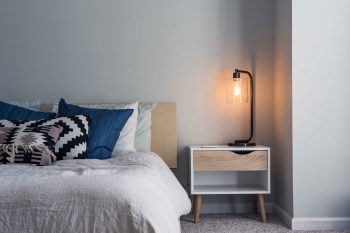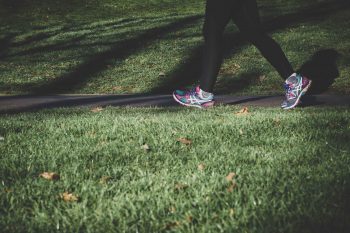Regardless of age, everyone is wired a little differently—some function best at the crack of dawn, while others channel their cognitive energy more effectively in the middle of the night. No matter what category you fit into, you can benefit from some improved sleep hygiene—here’s how:

1. Keep a Consistent Schedule
You should be aiming for the same bedtime and wake time every day—yes, even on the weekends. This regulates your body’s sleep-wake cycle to help you fall asleep and stay asleep. And sadly, there’s no playing catch-up on those lost hours either. Losing sleep on Thursday and sleeping-in on Saturday doesn’t mean you’re back to zero—you’re just confusing your body.
Instead of squeezing in study time by dipping into your eight hours of allotted sleep, try and plan ahead. Use your early wake time on the weekend to get some preemptive study time in. This will help prevent you from losing sleep on weeknights and sleeping-in to try and make up for it. Of course, things like concerts, parties, and other fun events come up and throw off your beat, but if you try not to change your schedule by more than an hour on weekends, you’ll be set.

2. Design Your Sleep Space
You will spend approximately 30% of your life in your bedroom, so you should make it a place that meets the conditions you will need for a good night’s sleep.
Clean
A cluttered room is a stressful room. Organization is what can help you avoid that creeping anxiety caused by a pile of dirty laundry you were supposed to wash two days ago—just when you’re trying to fall asleep.
Cool
Sleep usually begins when the body’s temperature drops, so a colder room will encourage sleep faster. Aim for between 60-67 degrees Fahrenheit to avoid the tossing and turning.
Comfortable
Is there anything better than a comfy bed? You’re looking for one that is not only less than ten years old, but also supportive and paired with an allergen-free pillow that works with your unique sleeping position. Flatter pillows usually provide better neck support for back or stomach-sleepers.
Quiet
Make sure your bedroom is free of any noises or distractions. Jolting awake at 3 AM from a car horn is in no one’s best interest. Try ear plugs, white noise, or ambient sound machines if you live in a particularly loud area.
Dark
For all those night owls or anyone who doesn’t rise with the sun, blackout curtains or quality shades are your sleep-inducing companion to block out unwanted rays of sunshine during exam week.

3. Manage Light Intake
Circadian rhythms determine a lot when it comes to daily sleep patterns. They naturally program us to be awake when the sun is up, and ready for sleep when the sun goes down, all while cueing other physical, mental, and behavioral changes. What can throw that off, however, is how you manage your overall light intake.
Blue light from electronic devices will trick your brain into thinking that it’s still daylight even when it’s not. Try changing your device’s color temperature or limit screen time an hour before you plan to go to sleep.
Reversely, make sure you’re getting adequate natural light during the day. Letting in some sun when you first wake up can help you stay alert for your classes or study sessions throughout the day. For short winter days or night owls, light therapy boxes can also provide an assist.

4. Exercise Regularly
Exercising on a daily basis is the best science-backed way to improve your sleep and wellness, and there are many ways to find the right, time efficient activity for you—from attending yoga classes to just a short walk. Body movement and physical exercise can cut the amount of time it takes you to fall asleep in half (so long as you aren’t exercising right before you go to bed, as the release of adrenaline can also make sleeping hard).
See our blog on how exercise can not only help you sleep better, but also help reduce stress and anxiety.


5. Shut It Down
Just like you power down your computer, you also have to power down your brain! The more overstimulated your brain becomes during the day, the harder it is to unwind when you are going to sleep. Plus, if you are always checking your phone, emails, or notes from class, your brain will learn to continue seeking fresh, new stimulation—even when you don’t want it to.
Racing Brain
Let’s face it, there will be nights when you just can’t turn it off—so keep a notepad on your nightstand just in case. You’ll avoid the bright light from your phone and be able to download your thoughts to paper so you can leave a memo for your future self. You can also try reading—not your Anatomy textbook, but a good, old-fashioned fiction book. This will help distract your brain while take advantage of the repetitive eye movements that help slow you down.
Appetite
Give your body at least two to three hours to digest before going to bed. Also, don’t go to bed hungry either. Both hunger pangs and digestive activity will be uncomfortable and keep you from catching some quality Z’s.
Substances
Avoid anything like caffeine, alcohol, or nicotine late in the day. As you’re likely aware, they will stimulate your body and keep you awake.
Napping
Irregular or long naps can confuse your internal clock, making it harder for you to initiate sleep or creating a disruptive sleep. Remember too, there’s no catching up on that missed sleep!
Planning for eight hours of sleep each night can certainly benefit your life—from reducing the risk of obesity, heart disease, and type two diabetes, to helping you stay awake during the day to study for your next COMLEX-USA exam. If you aren’t sleeping well and none of these suggestions seem to work, talk with your doctor to see what other solutions can be offered.

